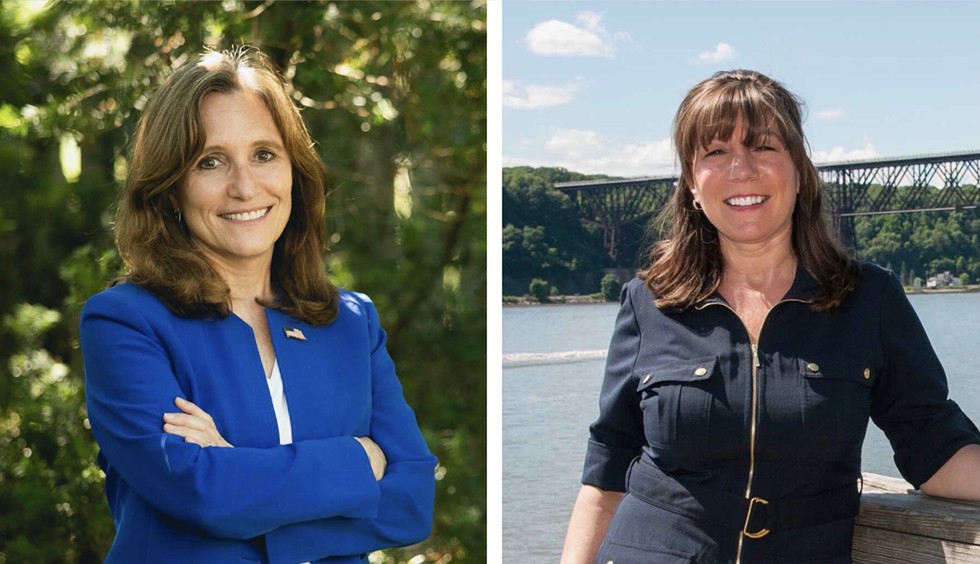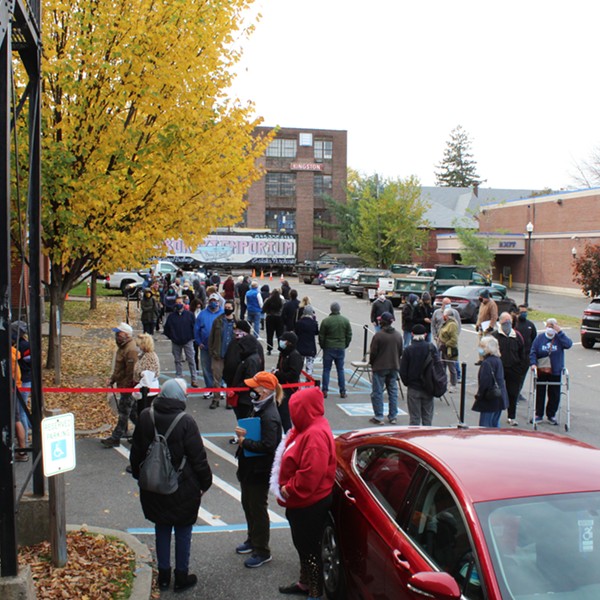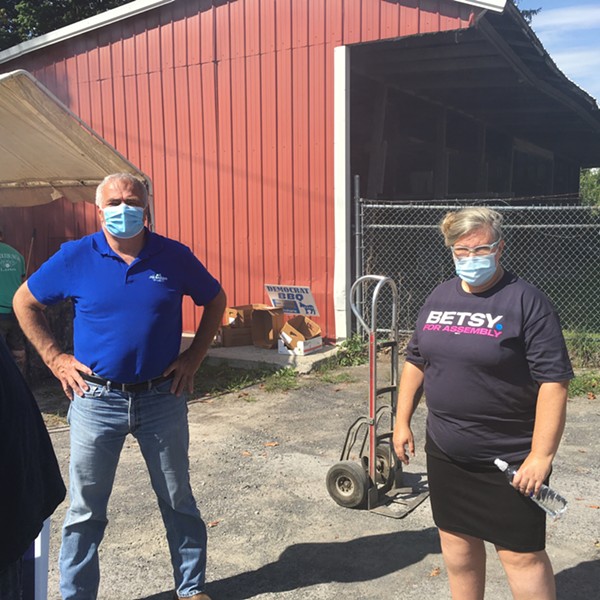In 2018, the “Blue Wave” came to the Hudson Valley. Voters concerned about health care and incensed by Donald Trump’s presidency elected two Democratic state senators and a Democratic congressman in districts long controlled by Republicans.
But the wave crashed before reaching the shores of Dutchess County. In the 41st state Senate district, which comprises almost all of Dutchess and the western half of Putnam County, Republican Sue Serino was able to ward off a challenge by Democrat Karen Smythe—by a mere 688 votes, out of 118,211 cast.
Now, it’s Round Two. Smythe is facing Serino once again, this time with lessons from the first contest under her belt. It figures to be close yet again, and money has poured into the race. Democrats hope changing demographics, an unpopular president, and Smythe’s increased profile will garner them an extra seat on election day, one of two pickups the party needs to gain a supermajority in the Senate.
Where They Come From
On paper, Serino and Smythe have similar backgrounds. Both were born in 1961 and raised in Dutchess County, and both spent much of their lives running small businesses before entering politics. Serino worked in real estate, incorporating Serino Realty in 2002 before winning election to the Hyde Park town board in 2010 and the Dutchess County legislature in 2011. Her brokerage, now based in Hyde Park, employs more than 20 agents, according to its website.
Smythe worked as a bookkeeper at her family’s business, C.B. Strain & Son, after graduating Vassar College in Poughkeepsie, then worked on the business’s financial side after graduating the University of Virginia’s Darden School of Business. The Senate seat would be Smythe’s first elected position.
Working with the various parts of the construction industry at C.B. Strain & Son informed how she wants to govern, Smythe says.
“My entire approach all through my career has been to work with the people I need to work with to accomplish I want to accomplish,” she says. “That for me is…one of the reasons why I ultimately decided to run for office: a frustration that the whole concept of compromise has become a dirty word.”
Serino is still president of Serino Realty, where she made between $50,000 and $75,000 in 2019 on top of her senatorial salary, according to financial disclosure forms.
Serino’s offices did not respond to a plethora of calls and emails requesting an interview.
What the Candidates (Say They) Will Do
The similarities between the two candidates do not extend to their political views.
Serino casts herself as a fiscal conservative and political moderate, a bastion against radical and costly downstate notions, while Smythe embraces progressive ideals about racial justice, climate change, and education.
The candidates fall on different sides of New York’s controversial issue of the year: bail reform. Bail was replaced with appearance tickets for misdemeanors and most nonviolent felonies after Democrats in the state Senate used their new majority to push the package through in 2019. The law took effect at the beginning of 2020, but legislators partially rolled it back months later as part of the budgetary process.
Police unions have sought to link bail reform to a rise in New York City’s murder rate, but Smythe says that misses the point: the system penalizes defendants who are legally innocent. She takes issue with the oft-repeated criticism that the reforms let “criminals” out of jail, since these defendants had not been convicted of the crimes alleged.
The system also disproportionately impacts the poor, who rarely have the means to afford their freedom, leading to lost jobs and the inability to mount a sufficient legal defense, Smythe says.
Some difficulty adjusting the system was to be expected. “To me, the fundamentals of bail reform were very logical and made a lot of sense as it relates to justice,” she says. “Anytime you change a system significantly…there will be things that are going to come up that you didn’t expect, or you didn’t think through.”
Serino opposed the reforms, introducing a series of bills to counter them. One would have allowed judges to order pretrial detention if they considered a defendant dangerous—current law only allows judges to take into consideration flight risk—thereby partially circumventing the reforms’ intent. Another would have added more than two dozen charges to the list of crimes where bail could still be set. Several of these charges are now bail-applicable due to the rollbacks.
Not allowing judges to jail defendants before trial because of their perceived dangerousness to the community “defies logic and puts public safety in jeopardy,” Serino said at the time.
Smythe has made the environment a significant part of her platform. She wants to create green jobs in the Hudson Valley and incentivize regenerative farming practices, which has earned her the endorsement of the New York League of Conservation Voters. She also is an ardent supporter the Climate Leadership and Community Protection Act (CLCPA), an ambitious law passed last year that aims to cut carbon emissions in New York 40 percent by 2030 compared to 1990 levels, and achieve net zero across the economy by 2050.
“I consider the climate crisis to be something that is upon us now, and we need to be actively addressing it,” Smythe says.
Smythe also wants to address systematic racism, though she admits it’s “a big issue that I fully expect to continue to be worked on long past my time.”
One way of correcting racial inequities is through economic opportunity, she says. She supports access to capital for low- and middle-income earners so they can start businesses, “because that’s sometimes that’s a barrier to getting started—you need to have money to get going, and without a relationship to a bank, that’s harder.”
Funding should be directed to helping Black residents buy their homes, which would allow them to benefit from the influx of new residents in the Hudson Valley instead of being displaced by them, Smythe says.
Racial disparities in the state education system are another problem Smythe wants to address, though she was short on specifics when asked about a better funding model. Public schools are mostly funded by local property taxes, making the quality of the school mostly dependent on the income level of the community.
On her campaign page, Serino touts her record, including her efforts to combat Lyme disease and her work with vets, and promises she will continue voting against any tax increases. Her biggest accomplishment in office was her work with seniors, according to Dutchess County Republican Chairman Michael McCormack.
“She’s always in the senior community at a picnic or at another function, or in the nursing homes,” McCormack says. “She doesn’t wait for them to come to her, [she] comes to them and makes sure their needs are listened to.”
Serino serves as the ranking member of the Senate Committee on Aging, and she has used the position as a bully pulpit to advocate for nursing home residents during the pandemic, when COVID-19 killed thousands of seniors in facilities across the state. She began demanding in April that the state Department of Health give nursing homes more leeway in choosing whether to accept recovering COVID-19 patients.
The Department of Health began forcing nursing homes March 25 to accept the patients to take pressure off hospitals. In an April 24 open letter to Governor Cuomo, Serino proposed clearing out some nursing homes around the state to use as specialized medical facilities for recovering COVID-19 patients and nursing home residents already sickened by the virus. This would stop the virus’ spread in nursing homes and allow COVID-19 patients to be concentrated in a facility more adept at treating them, according to the letter.
Governor Cuomo effectively rescinded his nursing home order in May. Since then, Serino has continued to advocate for the residents and rail against the DOH’s March 24 decision, pushing the legislature to hold hearings on the subject. Serino characterized the state’s responses during the hearings as “stonewalling” and demanded that legislative leaders issue subpoenas.
Whither the Campaign Trail
The two candidates have taken different approaches to campaigning during the pandemic. Smythe called off events and door-knocking, while Serino held some in-person events, such as a “Vets for Serino Kick Off!” at a Poughkeepsie bar in mid-October.
Smythe says that she attended Black Lives Matter marches, which allowed her to interact with engaged citizens. But she misses the door-to-door canvassing she did in 2018.
“I miss the opportunity to talk to people who are not as engaged in the political process, because they are equally as important, and I want to represent everybody,” she says. “There are folks working two jobs, they have kids, they just don’t have time to get more directly involved…knocking on doors enables me to go to people and meet them where they are.”
Smythe even declined to staff a campaign office, with staffers instead working from home. They’ve attempted to reach district residents via phone banking, joined in the effort by members of local grassroots organizations such as Act18 Indivisible and Hudson Valley Strong.
Hudson Valley Strong member Larry Cox, who also made calls for Democratic Congressman Antonio Delgado’s campaign, says the phone banking began in the spring, with volunteers calling residents—especially seniors—to ask about their concerns. They then called residents considered swayable, including registered Republicans, trying to get them to vote blue, before switching to calling likely Smythe voters in a get-out-the-vote effort.
Both candidates were hit with personal travails during their campaigns: Serino was diagnosed with breast cancer and Smythe’s father passed away.
Serino underwent a successful lumpectomy on June 2, according to a press release, and finished four weeks of radiation treatments on August 7.
Smythe’s father fell ill in late February and died in April, she says. Her father, who was 87, did not die of COVID-19, but was hospitalized as the virus bore down on the Hudson Valley. Visitation restrictions at the hospital meant the family was unable to see him for more than a week. They were able to move him home for hospice care a couple weeks before he passed, according to Smythe.
“We also experienced not being able to do a full funeral for him,” she says. “We did a small graveside service and said, at the time, ‘OK, well, we’ll throw him something later,’ and I think the ‘later’ is probably going to be…sometime next fall.”
“COVID changes everything in so many ways.”
Where They Stand on Health Care
No other issue dominated the 2018 midterm elections like health care, and controversy over the potential repeal of the Affordable Care Act was felt acutely in the Hudson Valley.
In January 2017, President Trump and congressional Republicans were concocting the American Health Care Act (AHCA), which would have repealed and replaced Obamacare. Republican John Faso, who was serving his first term as the Hudson Valley and Catskill’s congressman, was approached by a woman from a small crowd of demonstrators near his home.
Faso recognized the woman, who went to school with his children, before she told him she now had a brain tumor and a spinal condition. She had been kicked off her private insurance for having a pre-existing condition. Now she was in tears, pleading for Faso to promise to “not take this away from us.”
A video of the encounter shows Faso saying “I promise” three times before hugging the woman.
But later that winter, Faso voted to advance the AHCA from committee, allowing it to come to the House floor, where he again voted in favor of the repeal-and-replace bill. Faso was defeated in 2018 by Antonio Delgado, who shot a campaign ad about the encounter , leading to national media attention.
Obamacare remained in place after the AHCA was defeated in the Senate, but a grassroots movement had crystalized around the issue in the Hudson Valley. Many of these groups now support the New York Health Act, which would automatically provide health care to every New Yorker. Funding for the new system would require a whopping 156 percent increase in state tax revenues, but the bottom 90 percent of income-earners would ultimately come out ahead, saving more on health care then they spend on new taxes, according to a study by the RAND Corporation.
On her campaign site, Serino comes out strongly against the act, saying it would “put politicians in charge of your healthcare” and threaten union-negotiated health plans.
When asked by The River, Smythe declined to endorse the New York Health Act, saying she had concerns about its funding and how long it would take to implement, but that her goal was to “provide quality, affordable health care” for all New Yorkers.
Conner Brennan, a Tivoli resident and organizer with Hudson Valley Demands New York Health, says he received a similar response when he posed the question to Smythe.
“It’s frustrating to hear someone tell you, ‘health care is a human right, absolutely,’ and then tell you, ‘well, this is why I can’t support it 100 percent,’” Brennan says. “Do you think this is an unalienable human right that all people should have, and you’re going to work towards making it a reality, or are you only paying me lip service?”
Despite that, Brennan is supporting Smythe because he believes Democrats winning a supermajority in the Senate might push party leadership to hold a vote on the act, something which has not happened since Democrats gained control of both the Senate and the Assembly in 2018. Democratic leadership refuses to hold a vote because of the required tax increases, Brennan says.
“We also recognize that it’s not just electing any old Democrat,” Brennan said. “…we hope that electing Karen Smythe will bring us a step closer to getting the New York Health Act, but we know we will have to push her on it, and we’ll have to hold her feet to the fire.”
It Takes a Nation of Million$…
Money has poured into the race in increasing sums as individuals, corporations, unions, and special interest groups try to get their woman elected.
Since mid-July, the two campaigns have raised more than $430,000, with nearly $180,000 of that sum raised in the three weeks ending October 19, according to state disclosure filings.
Smythe raised significantly more than Serino from individual contributions, according to disclosure reports, especially since the end of September. Serino raised far more from corporations and LLCs since mid-July—nearly $53,000 versus $2,500 for Smythe.
Over that time, Serino’s largest contributions—$14,500 combined—came from two closely related, NYC-based political action committees representing landlords, which have filled the coffers of other GOP candidates across the state. Smythe’s largest contribution, on the other hand, was from NYSUT, the state teacher’s union.
Union endorsements and union monies nearly go exclusively to Democrats, and the Serino-Smythe matchup is no different, save the notable exception of the Civil Service Employees Association (CSEA), which represents more than 275,000 state employees.
CSEA spokeswoman Jessica Ladlee called Serino a “longtime friend” to the union. Serino’s re-election is a top priority because of her work maintaining services provided by CSEA members to people with special needs in the state, as well as her work opposing a merger between the New York State Bridge Authority and the New York State Thruway authority, both of which employ CSEA members.
“The bottom line is that we support those who support us, regardless of party affiliation,” Ladlee adds.
A Changing District
The race’s winner may not be decided by money, endorsements, or specific policies, but by demographics.
Serino won against Smythe in 2018 by only 688 votes. The following year, the number of registered Republicans in the district fell by about 1,200, while the number of registered Democrats rose by more than 1,500, according to the state Board of Elections.
The pace of Democratic enrollment has only quickened since as the pandemic pushes downstate residents into the relative safety of the mid-Hudson Valley, according to Michael McCormack, the chair of the Dutchess County Republican Committee.
“Within the past year, our numbers show there’s about 4,000-plus Democratic voters coming into [Dutchess] County,” McCormack said “…The Democratic Party had been gaining strength previously, for sure, but now they really have a really high-end strength.”
Carolyn Guyer, the chair pro tempore of the Wappingers Falls-based Act18 Indivisible, a progressive grassroots group, says Republicans were disproportionately represented in local government even before the pandemic’s downstate diaspora.
The 41st Senate district has had more registered Democrats than Republicans since its creation in 2012, according to state enrollment numbers. But Dutchess County, which makes up the bulk of the district’s population, currently has a Republican county executive and a Republican-controlled county legislature.
“The minority party has been running Dutchess for a very long time,” Guyer says. “We are long past due for more balanced representation locally, as well as at the State level—one that reflects the actual views of the citizens.”
Roger Hannigan Gilson is a Hudson Valley journalist and humorist. A former crime reporter for the Register Star, he now runs the news site The Other Hudson Valley.



















